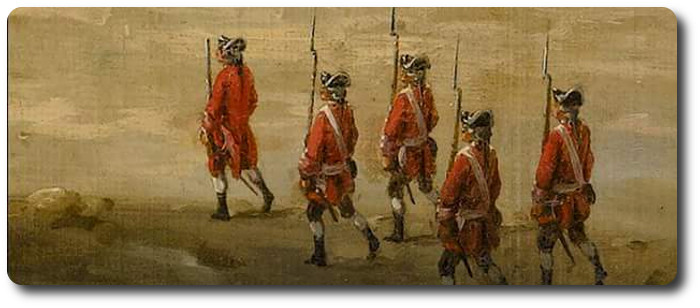Topic: Drill and Training

Soldiers (1776)
The Military Guide for Young Officers, Thomas Simes, Esq., 1776
The Officer should instil in the heart of the soldier, that obedience is the foundation of regularity and order; that, by this, discipline is maintained; by this, great designs are executed; and, without it, all is confusion and disorder.
A soldier should be brave, vigorous, careful, and obedient to all his Officers, from the General to the Corporal; and obey the orders of the latter as if coming from the mouth of the former, as in reality they do; the Corporal being the only means by which they are conveyed. He should take care that his uniform, as well as other apparel, be neat and clean; his arms and accoutrements bright and in good order, the use of which he ought diligently to study, and also all his different duties; he should be master of all the beats of the drum and tunes of the fife, and instantly obey them; he should diligently attend his colours on all occasions; the limitation of his furlough should be religiously observed; his time for food and sleep regulated, not by his will, but by his leisure. When sentry, he should be alert, and observe his orders exactly and inviolably; ask no reasons for them, or dare to think them of little importance. The excuse of a soldier, convicted of quitting, or sleeping on his post, frequently is, that he thought no accident or bad consequence could attend it. How absurd! The necessity of his being posted there, is evident by his being ordered there. Suppose it in time of peace, there might (though unknown to him) be a large quantity of gunpowder, the money, arms, or accoutrements of the regiment, and many other things that perhaps his Officer might not think proper to inform him of.—It was in his orders, let them be his guide.
The Officer should instil in the heart of the soldier, that obedience is the foundation of regularity and order; that, by this, discipline is maintained; by this, great designs are executed; and, without it, all is confusion and disorder.
The first thing that soldiers are to be taught is the military step; which can only be acquired by a constant practice of marching quick or slow together. It is of consequence on the march, or in the line, that they keep their ranks well dressed; for men who march in an irregular manner, are in disorder; and, if fallen upon by the enemy, must be defeated.
Nothing is more essential; for a man may be attacked in 4 parts; in the front, in the rear, and on both flanks; but he can defend himself, and annoy the enemy, only when his face is turned towards them.
Marching is reduced to 3 points; front, and both sides; (because it is impossible to do it regular, or at any times, backwards) and by this means you may face the enemy wherever it presents itself. The different steps to be used are 3; slow, fast, and oblique; which may be termed traversing.
The first is proper in advancing upon the enemy, when the ground is unequal, that the line may not be broken; the second is chiefly necessary, when you want to anticipate the enemy in occupying some post, or passing a defile; or, above all, in attacking a retrenchment, to avoid being a long while exposed to the fire of the artillery and small arms; and lastly, when you come near the enemy, you must then advance with a bold fast step, have your bayonets fixed, and charge with vigour and vivacity.

